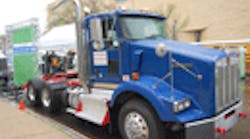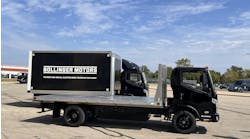Though natural gas is not projected to become a silver bullet for the commercial vehicle market, capable of replacing diesel as the primary fuel for every type of truck, its economics are becoming extremely favorable in several key segments. This should spark wider adoption of more natural gas-powered models in the near future.
“We’re finding that natural gas has a certain place when it comes to heavy truck operations,” Ryan Carmichael, a transportation analysts with global consulting firm Frost & Sullivan, told Fleet Owner.
“We’re finding it’s a particularly good fit for regional fleets, port freight facilities, and especially refuse operations,” he explained. “The price advantage of natural gas versus diesel in these specific segments is what will be the storyline here.”
Frost & Sullivan research – encapsulated in a report entitled Strategic Analysis of the North American Class 6-8 Natural Gas Truck Market – predicts the market for natural gas-powered trucks in this segment will grow from a population of 1,950 units today to well over 29,483 units in 2017, which is roughly 8% of total Class 6-8 production six years from now.
Carmichael said the critical pieces of the natural gas truck growth puzzle will be substantially lower fuel costs when compared to diesel alongside the lower premiums for spark-ignited compressed natural gas (CNG) and liquefied natural gas (LNG) technology, at $29,750 and $27,750, respectively, compared to the pricier “compression ignition” system used for the heaviest over-the-road Class 8 models, which cost $72,450 more on average than a comparable diesel-powered unit.
“The real push is going to come from the lower cost of natural gas,” Carmichael explained. “Factored in with the reduced range natural gas-powered vehicles achieve, most fleets we’ve studied conservatively pay $1.65 to 1.80 for natural gas per equivalent diesel gallon. That’s significantly lower than the nearly $4/gal. most fleets are paying now for diesel and that savings accrues rapidly over time.”
Refuse fleets that use converted landfill gas to power their trucks see an even bigger fuel cost differential, with one Utah fleet Frost & Sullivan studied paying 86 cents for its natural gas fuel per equivalent gallon, Carmichael said.
That price differential is also encouraging new investments in natural gas fueling infrastructure projects.
For example, Canadian-based natural gas engine maker Westport Innovations entered into an agreement with Shell to launch a co-marketing program in North America aimed at providing customers a better economic case when purchasing and operating LNG-powered vehicles by consolidating key value chain components such as fuel supply, customer support and comprehensive maintenance into a single, user-friendly package.
Under terms of the agreement, both companies will leverage their positions in liquefied natural gas (LNG) production and distribution for Shell and LNG systems and technology for Westport, to deliver an integrated commercial solution to participating customers, initially in North America.
Shell also plans to make LNG available for heavy-duty fleet customers beginning in 2012 at select Shell Flying J truck stops in Alberta, Canada. The company said it is pursuing engineering and regulatory permits to produce LNG by 2013 at its Jumping Pound gas processing facility in the foothills of Alberta, Canada. Until then, LNG will be supplied to the Shell Flying J truck stops from third-party supply agreements.
“We believe that natural gas, because of its abundance and strong environmental profile, is a destination solution in the transportation fuels space,” noted José-Alberto Lima, Shell’s vp-LNG and gas monetization. These projects “will allow us to bring these benefits to market in a way that I believe can potentially transform fuel consumption in the heavy-duty vehicle segment for years to come.”
Frost & Sullivan’s Carmichael added that providing wider access to lower cost natural gas for regional truck operators will also help reduce the return on investment (ROI) cycle for these kinds of fleets.
“Right now, at the current differential between natural gas and diesel prices, we’re looking at a two- to three-year payback period for the spark-ignited style of natural gas propulsion technology,” he explained. “As most regional operators keep their vehicles anywhere from eight to 10 years, that payback period creates a strong strategic benefit for them.”



